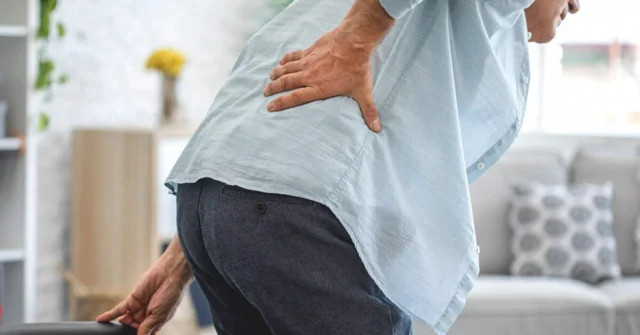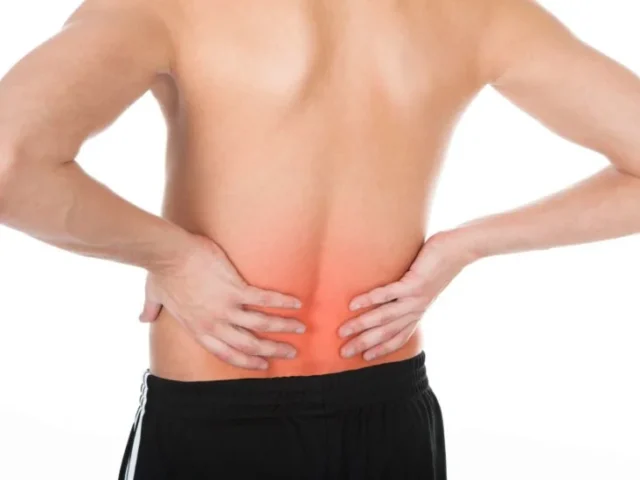
Knowing when lower back pain is serious can be critical, or life-threatening is knowledge that can save a life.
For example, let’s say you are at a family get together and a family member unexpectedly slips and falls on the driveway, due to bad weather conditions. You help the person up, but their pain increases throughout dinner. What do you do? How do you assess the situation?
We asked Dr. Brandon Claflin of Oklahoma, pain management specialist who sees hundreds of patients with low back pain each year, to tell us when and when not, lower back pain should result in a trip to your doctor or an emergency room.
There is a widely known statistic that 80% of adults will get low back pain sometime in their lives. Therefore, it is important to know when low back pain is serious, or critical, to a family member’s health and to your own health and quality of life, as well.
Back pain is common. If you sit too long, pick up heavy bags of groceries and twist during the process, or work out too strenuously, back pain can develop. There may be times when you feel your life is ruled by your low back pain, and the rest you give your body doesn’t seem to be helping. How serious is it? Why are some conditions more serious?
The Usual Path of Low Back Pain According to Dr. Brandon Claflin of Oklahoma

The board-certified doctor began our conversation by reminding us about the usual course of low back pain.
“Low back pain can be quite intense, but it will usually subside within a few weeks. Most cases of low back pain are not medical emergencies, but a doctor’s evaluation will give you an accurate diagnosis and a plan of treatment,” he stated.
“However, if your pain has been increasing instead of decreasing, it’s time to make that appointment with your medical doctor. There are cases where back pain may be related to pancreatitis, gallstones, uterine fibroids, and endometriosis. In cases such as traumatic injury, or a fall of an elderly person on a wet driveway causing low back pain, this may result in a broken bone or other internal injury.”
There may be many reasons why you’re suffering from back pain. The best plan for diagnosis and care is to initially see a spinal pain specialist, and then every four-to-six weeks afterward, unless your progress is continual.
The Five Signs That You Should Head on Over to the ER
According to Dr. Brandon Claflin of Oklahoma, there are five main symptoms that may occur with low back pain that are medical emergencies.
1. Loss of bowel and/or bladder control

“Sudden onset of incontinence of the bowels or bladder should not be regarded as a result of low back pain. But if it occurs, it can indicate a disc herniation, compression on a nerve, abscess/hematoma, tumor or cauda equina syndrome,” he stated.
The nerves at the end of the spinal cord in the lower back resemble a horse’s tail. This area of the spine is called the cauda equina. These nerves provide sensation to the legs, bladder and pelvic organs.
Cauda equina syndrome is a diagnosis that is given when these nerve roots have become dysfunctional. This is a medical emergency because there is a risk of permanent nerve damage, which may result in paralysis.
2. Weakness in your legs

Weakness in the legs may result from pressure on more than one nerve root. This may affect the ability to stand, sit, use the toilet, and walk.
3. Radiating pain

Radiating pain, or the feeling of numbness or pins and needles in the buttocks or groin, are the third symptoms. They are all mentioned together because they might be a sign that a spinal nerve is compressed or there’s spinal stenosis. In these cases, an MRI or CT scan gives doctors insight into the problem.
Radiating pain is called radiculopathy. Its most common cause is nerve root compression from disc herniation, caused by either a traumatic injury or chronic degeneration of the spine.
4. High fever

A high fever indicates there may be an abscess or infection that needs to be cared for, before it spreads to the surrounding tissues or organs.
5. Sharp pain or severe stomach pain

“If the pain is sharp, it may be because a muscle, ligament, or internal organ is damaged in some way. For example, it’s rare, but severe back pain could indicate that an aneurysm in a blood vessel or heart has ruptured, and there is internal bleeding. That’s the fifth symptom,” Dr. Brandon Claflin of Oklahoma shared.
These five signs may be summed up in five questions that are asked of someone suffering from low back pain:
- Are you having any problems going to the bathroom with urination or having bowel movements?
- Do your legs feel weak when you stand, sit, or walk?
- Do you feel numbness, or pins and needles, or radiating pain?
- Is the pain sharp?
- Do you have a fever?
Dr. Brandon Claflin in Oklahoma Gives Additional Suggestions
If you don’t have pain that fits the requirement to go to the Emergency Room, checking out the root of your pain is still very important – and a spine pain management specialist takes a conservative route during your care.
“There are additional options for treating pain, ones you may be able to do on your own to speed recovery. Some of them are noninvasive, which are used commonly,” Dr. Brandon Claflin in Oklahoma stated.
For example, massage, behavior therapy, acupuncture, breathing, meditation, visualization, and other relaxation techniques may not directly affect the root cause of your pain, but they may influence involuntary bodily functions and thus improve your physiology. These may affect your mind-body connection and help you cope better with the situation.
Exercise therapy, spinal manipulation, non-surgical spinal decompression, and multidisciplinary rehabilitation programs may directly address the root of what’s causing the low back pain.
In some unfortunate situations, a traumatic injury may have occurred at work or during a car accident, for example. Injuries may have even caused the loss of your job. This situation can definitely affect not only your body, but also the emotional and financial aspects of your life. If this applies to you, consulting a personal injury lawyer who can help mitigate these other parts of your life may be a consideration. Additional suggestions may be found by reading a guide to dealing with a job loss after an injury.
Remember the five questions to ask someone who has low back pain. Asking these questions, and following the medically recommended suggestions, can help you differentiate whether or not a trip to the emergency room is prudent.








